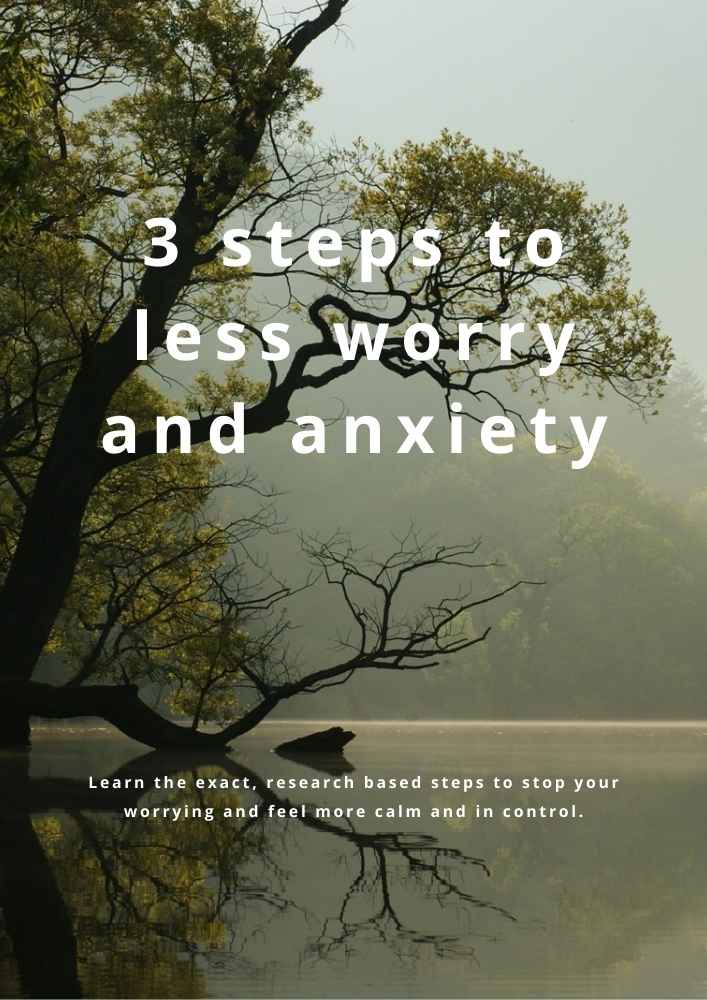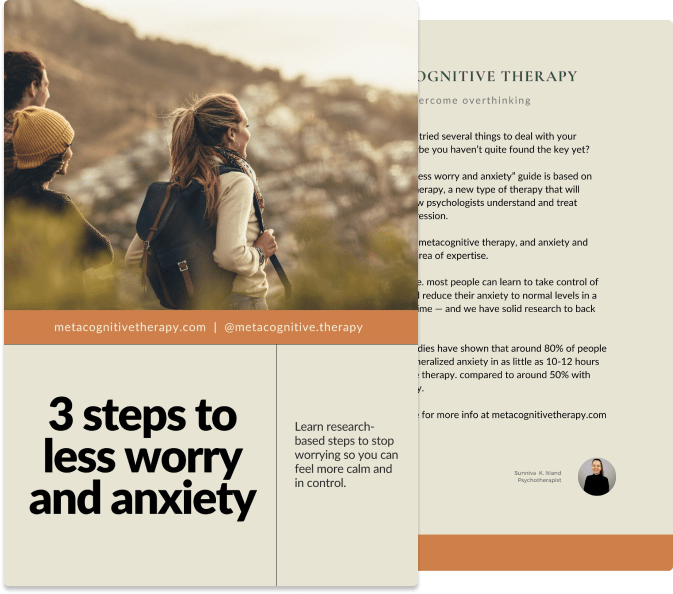Answering your common objections to Metacognitive Therapy

Download our best tips on reducing anxiety and worrying
Learn three powerful metacognitive therapy steps to stop the worry cycle, reduce anxiety, and feel calmer in everyday life.
.jpeg)
.jpeg)
If you're new to Metacognitive Therapy, you might feel some resistance as you learn more about it. That's completely understandable.
Metacognitive Therapy (MCT) is a revolutionary new science-backed therapy that's changing how mental health concerns are treated. Its anti-therapy approach goes against a lot of the therapies, mindfulness and wellness practices that are popular today.
It's that completely different approach that makes it one of the most effective treatments available. But it can raise a lot of questions, so we're addressing the most common objections and concerns we hear about the method.
'Worrying is out of my control, it's not a choice. So how can MCT stop it?”
Though your worrying may feel uncontrollable somedays, if worry was truly uncontrollable, it would never stop. Think about it: there are plenty of moments when your worry fades away and your attention shifts naturally. For instance, when an anxiety spiral is interrupted by your phone ringing, you’ll likely shift your attention to the phone call and stop focusing on your worries in those moments.
Anxious thoughts come and go — the thoughts themselves aren't necessarily in your control, but worrying about them is. MCT helps you realize that you do have control over how you engage with your thoughts, and that you can give them less attention.
What if you believed you could start and stop worrying whenever you like? Would you feel less stressed when a worry pops up? MCT helps you develop this awareness so you can feel empowered and in control of your focus.
Is MCT just thought suppression? Don’t you need to process trauma to heal?
MCT doesn’t actually promote suppressing negative thoughts. Rather than analyzing every thought, it instead helps people relate to their thoughts in a more passive way that allows their mind to regulate naturally.
People often respond to negative thoughts in two unhelpful ways: bottling or brooding. Bottling involves pushing away uncomfortable feelings, believing it's weak or harmful to have them. With brooding, people get stuck in repetitive analysis, constantly revisiting painful thoughts and feelings without resolution.
Neither of these strategies works, and people often switch between both—trying to avoid thoughts, then getting trapped in worry and rumination.
But what about the commonly held belief that you need to process trauma in order to heal from it? Research shows we don’t need to dig into past traumas to process them. The idea that we need to 'process' everything comes from psychoanalytic theories, which suggest unresolved memories cause mental distress. But the mind already has a natural self-regulating system. Most people recover from trauma without developing long-term issues — it's when rumination becomes a habit that problems like PTSD arise.
Trying to control your mind is like trying to control the weather. It’s ineffective and can backfire. By letting it be and trusting your mind’s natural resilience, you can create the best conditions for the mind to heal on its own.

Download our best tips on reducing anxiety and worrying
Learn three powerful metacognitive therapy steps to stop the worry cycle, reduce anxiety, and feel calmer in everyday life.
But I have real life problems I need to deal with—Isn't ignoring them avoidance?
Metacognitive Therapy never encourages ignoring problems. Instead, it helps you approach them without getting stuck in unhelpful patterns of worry and rumination.
Let’s say two people have lost their jobs. One spends countless hours worrying about getting a new job, criticizing themselves, and imagining worst-case scenarios. The other faces the same challenge, but doesn't dwell on it endlessly, and instead focuses on taking productive action. The key difference isn’t the problem itself—it’s how much headspace it occupies. Rumination drains your energy, undermines your confidence, and often makes it harder to actually solve the problem.
MCT teaches you to ask practical questions: Can I do something about this problem right now? If the answer is yes, take action. If not, let your mind rest and revisit the problem later when you're in a better mental state.
Research backs this up: For example, heart attack patients face a real risk of a second heart attack. But worrying about it constantly doesn’t reduce that risk—it only adds stress and diminishes their quality of life. MCT isn’t about ignoring problems—it’s about engaging with them strategically, without letting them consume your mental energy, so you can live fully even when facing challenges.
Doesn’t thinking about things help me prepare?
It’s natural to believe that worrying helps us stay prepared for all scenarios… but how often do situations unfold exactly as your worries predicted? Does worry help you see all sides of a situation, including positive possibilities? Or does it narrow your focus to worst-case scenarios?
Most people find that their worries are exaggerated and biased toward negative outcomes. What happens when you handle unexpected situations without worrying beforehand? Were you able to solve the problem? We’re usually able to navigate challenges without needing to predict every detail.
Some people believe worrying helps them avoid mistakes. But do you really make fewer mistakes when you worry? Could worrying pull focus away from tasks, so mistakes are more easily made? Are you better at solving problems when you're calm and focused, or when you're tired and anxious? If worry was truly effective, people who worry the most would face fewer issues—but that’s rarely the case.
MCT teaches you to engage with life directly, with clarity and confidence, rather than being weighed down by endless “what ifs.”
But MCT Doesn’t Address My Feelings
It may seem like MCT ignores or dismisses feelings during treatment, but MCT consistently acknowledges that feelings—both positive and negative—are natural, fleeting parts of the human experience. Problems arise when we attempt to suppress, overanalyze, or misinterpret the importance of negative feelings.
Think of how children can experience their emotions fully—anger, sadness, excitement—without lingering on them or trying to dissect their meaning. A child can cry one moment and resume playing the next, even if the sadness hasn’t completely disappeared. Adults are capable of the same: we don’t need to “fix” our feelings before moving forward with life. In fact, the more time we spend analyzing negative emotions, trying to trace their origin or judging ourselves for having them, the more they linger. Research shows that instead of trying to regulate emotions, it’s more effective to simply reduce the time spent engaging with them.
MCT teaches a gentle approach: allow your feelings to be there without suppression or judgment. By practicing detached mindfulness, you can acknowledge these emotions without getting trapped in them, trusting that they will naturally pass through your mind.
The Metacognitive Therapy method seems too simple for my complex issues/diagnosis
The brain actually operates in simple ways: What we give attention to grows, and what we try to suppress becomes more persistent. This is because focusing on a symptom or thought signals to the brain that it's important, even when we want the opposite to happen.
Think of your brain like an algorithm: if you think a lot about a scenario, your brain will produce even more thoughts about it. The same happens when you try to rationalize or change negative thoughts into positive ones—engagement only reinforces them. Many people assume that thinking their way out of overthinking will work, but this usually backfires.
MCT is deceptively straightforward: it encourages letting your thoughts be. But simple doesn’t mean easy. This approach can be quite challenging for people who have actively engaged with their thoughts for a long time. But everyone is capable of using detached mindfulness, we just need to practice applying it to our most distressing thoughts, so the mind can focus on what truly matters.
Whether you’re experiencing a complicated life challenge, or a complex diagnosis, the method works the same. And research shows how effective MCT is in treating conditions like depression, anxiety, PTSD, early trauma, and personality disorders.
Metacognitive Therapy sounds just like mindfulness…
MCT and mindfulness may seem similar at first, but they’re fundamentally different in their approach and goals. Unlike traditional mindfulness practices, MCT does not use practices like sitting meditation, visualization, or focusing on the breath. There are no body-focused exercises or anchors for attention. Instead, MCT emphasizes meta-beliefs (your beliefs about your thoughts) and detached mindfulness, so you can recognize that thoughts are separate from you, and that you don't need to engage with or control them.
While mindfulness aims to cultivate relaxation, reduce stress, or help people with acceptance, MCT doesn’t prioritize calmness or lowering discomfort. The goal is simply to detach from negative thoughts and feelings, without conceptual processing. This doesn't mean suppressing or changing thoughts, but rather seeing them as unimportant and choosing not to engage.
MCT's approach may feel counterintuitive because it focuses on doing nothing rather than actively cultivating acceptance or a relaxation practice. But this 'do nothing' strategy can ultimately free the mind from unhelpful thinking patterns that maintain distress. So while mindfulness is valuable for many, MCT offers a highly targeted and lasting method for overcoming worry and rumination.
If you’re interested in Metacognitive Therapy and want to explore if it’s right for you, start by taking this quiz to see if it can help.



